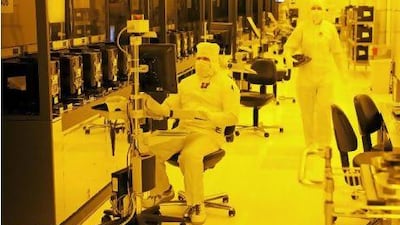The UAE's semiconductor industry took a leap forward this week as a technology firm based in Dubai completed the design of what is likely to be the Gulf's first commercial microchip.
SenseHere, a company working with the American University of Sharjah (AUS), said it was ready to commission a test version of its microchip, which cost US$1.2 million (Dh4.4m) to develop.
If tests are successful, the company is forecasting 100 million unit sales over the next five years.
SenseHere's "mixed signal processor" chip allows for the detection of specific radio signals in areas where there is a lot of interference.
Potential uses include automatic switches to turn off household lights or air conditioning when not needed.
The low-energy, UAE-designed chip could benefit the environment, said Tan Rasab, the chief executive and co-founder of SenseHere.
"Our chip will enable buildings to be more energy efficient," said Mr Rasab.
"If a room is unoccupied, the air conditioning can be automatically adjusted, and the lighting can be switched off. What we've designed is a way those signals can be detected."
The company hopes to start producing the chip commercially within a year.
Mr Rasab said the company had been in discussions with the Advanced Technology Investment Company (Atic), which is owned by the Abu Dhabi Government, over the manufacture of the chip. Atic owns almost 90 per cent of Globalfoundries, which is planning to build a $6 billion to $8bn chip-manufacturing plant in the UAE capital, which is set to start operations in 2015.
However, Mr Rasab said the company would not wait until 2015 to begin production - and the chips would probably be made in China or Taiwan.
Brian Lott, the executive director of communication at Atic, confirmed discussions with SenseHere had taken place - and said the chip achievement was good news for the UAE's nascent microchip industry.
"It is extremely encouraging to see the growing interest in the semiconductor industry take root in the UAE," said Mr Lott.
When SenseHere's chips hit the market, Mr Rasab expects demand from China, India, the Middle East and Africa.
"We're talking about a potential market of three billion households," he said. "We expect to sell at least 100 million chips over the next five years. We expect to hit revenues of around $60m to $70m."
The production cost will be between $1 and $1.30 per chip, which the company expects to sell for $2.50.
Crucially, the SenseHere chip is very energy efficient - which means batteries last longer.
"Imagine the Burj Khalifa, which may have 10,000 sensors embedded into the [building's] fabric, and somebody has to change the battery every two to three years. The costs mounts up," said Mr Rasab.
SenseHere holds the patent for the chip. Michael Castle, the chief technology officer and co-founder at SenseHere, designed the initial architecture of the chip - but said AUS could benefit from future royalty payments.
"The team at AUS developed the chip and carried out simulations to prove the chip will meet the specifications," he said. "If, in the future, the production chips uses [technology] developed and owned by AUS then SenseHere will pay royalties."
Dr Lutfi Albasha, a professor in microelectronic design at AUS, is confident the chip will pass the testing phase.
"We're very optimistic that it will work," he said.

